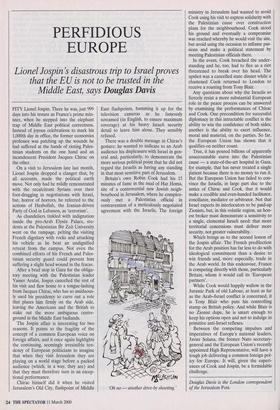PERFIDIOUS EUROPE
Lionel Jospin's disastrous trip to Israel proves that the EU is not to be trusted in the
Middle East, says Douglas Davis PITY Lionel Jospin. There he was, just 999 days into his tenure as France's prime min- ister, when he stepped into the elephant trap of Middle East political correctness. Instead of joyous celebrations to mark his 1,000th day in office, the former economics professor was patching up the wounds he had suffered at the hands of rioting Pales- tinian students on the one hand and an incandescent President Jacques Chirac on the other.
On a visit to Jerusalem late last month, Lionel Jospin dropped a danger that, by all accounts, made the political earth move. Not only had he mildly remonstrated with the recalcitrant Syrians over their foot-dragging in negotiations with Israel, but, horror of horrors, he referred to the actions of Hezbollah, the Iranian-driven Party of God in Lebanon, as 'terrorism'.
As chandeliers tinkled with indignation inside the pro-Arab Elysee Palace, stu- dents at the Palestinian Bir Zeit University went on the rampage, pelting the visiting French dignitary with rocks and attacking his vehicle as he beat an undignified retreat from the campus. Not even the combined efforts of his French and Pales- tinian security guard could prevent him suffering a slight head wound in the fracas.
After a brief stop in Gaza for the obliga- tory meeting with the Palestinian leader Yasser Arafat, Jospin cancelled the rest of his visit and flew home to a tongue-lashing from Jacques Chirac, who has so assiduous- ly used his presidency to carve out a role that places him firmly on the Arab side, leaving the Americans and the British to stake out the more ambiguous centre- ground in the Middle East badlands.
The Jospin affair is interesting for two reasons. It points to the fragility of the concept of a common European voice on foreign affairs, and it once again highlights the continuing, seemingly irresistible ten- dency of European politicians to imagine that when they visit Jerusalem they are playing on a world stage before a packed audience (which, in a way, they are) and that they must therefore turn in an excep- tional performance.
Chirac himself did it when he visited Jerusalem's Old City, flashpoint of Middle East flashpoints, hamming it up for the television cameras as he famously screamed (in English, to ensure maximum coverage) at his heavy Israeli security detail to leave him alone. They sensibly refused.
There was a double message in Chirac's gesture: he wanted to indicate to an Arab audience his displeasure with Israel in gen- eral and, particularly, to demonstrate the more serious political point that he did not regard the Israelis as having any standing in that most sensitive part of Jerusalem.
Britain's own Robin Cook had his 15 minutes of fame in the mud of Har Homa, site of a controversial new Jewish neigh- bourhood in Jerusalem, where he conspicu- ously met a Palestinian official in contravention of a meticulously negotiated agreement with the Israelis. The foreign `Oh no — another drive-by shooting.' ministry in Jerusalem had wanted to avoid Cook using his visit to express solidarity with the Palestinian cause over construction plans for the neighbourhood. Cook stood his ground and eventually a compromise was reached whereby he would visit the site, but avoid using the occasion to inflame pas- sions and make a political statement by meeting Palestinian officials there.
In the event, Cook breached the under- standing and he, too, had to flee as a riot threatened to break over his head. The upshot was a cancelled state dinner while a chastened Cook returned to London to receive a roasting from Tony Blair.
Any questions about why the Israelis so fiercely resist a more substantial European role in the peace process can be answered by examining the performances of Chirac and Cook. One precondition for successful diplomacy in this intractable conflict is the ability to win the confidence of both sides; another is the ability to exert influence, moral and material, on the parties. So far, the European Union has shown that it qualifies on neither count.
True, it has poured billions of apparently unaccountable euros into the Palestinian cause — a state-of-the-art hospital in Gaza, for example, that has never treated a single Patient because there is no money to run it. But the European Union has failed to con- vince the Israelis, in large part due to the antics of Chirac and Cook, that it would make a credible and even-handed facilitator, conciliator, mediator or arbitrator. Not that Israel expects its interlocutors to be paid-up Zionists, but, in this volatile region, an hon- est broker must demonstrate a sensitivity to a single, elemental Israeli need: that more territorial concessions must deliver more security, not greater vulnerability.
Which brings us to the second lesson of the Jospin affair. The French predilection for the Arab position has far less to do with ideological commitment than a desire to win friends and, more especially, trade in the Arab world. In this endeavour, France is competing directly with those, particularly Britain, whom it would call its 'European partners'.
While Cook would happily wallow in the Jurassic Park of old Labour, at least as far as the Arab-Israel conflict is concerned, it is Tony Blair who puts his controlling stamp on British policy. And while Blair is no Zionist dupe, he is smart enough to keep his options open and not to indulge in primitive anti-Israel reflexes.
Between the competing impulses and imperatives of Europe's national leaders, Javier Solana, the former Nato secretary- general and the European Union's recently appointed High Representative, will have a tough job delivering a common foreign pol- icy for Europe. It will, given the experi- ences of Cook and Jospin, be a formidable challenge.
Douglas Davis is the London correspondent of the Jerusalem Post.


































































 Previous page
Previous page